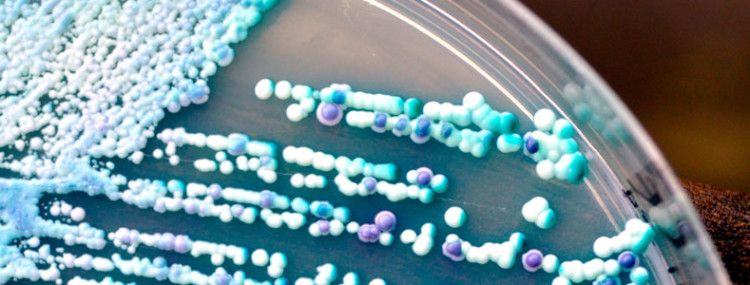
3 Ways to Stop Candida FOR GOOD!
Candida is a fungal form of yeast that grows in your mouth and intestines, and sometimes on your skin. This overgrowth of fungus can cause a number of symptoms ranging from skin and vaginal infections, to depression, anxiety, and mood swings. People at risk for candida overgrowth are those who have a damaged digestive system, those who eat a diet high in refined sugars, grains, and alcohol, and anyone on prescription medications that reduce the amount of beneficial bacteria in your body, like antibiotics and the birth control pill.
How Do I Know if I Have Candida Overgrowth?
The wonderful people over at Food Matters have created an easy candida test that you can do at home with no special equipment: First thing in the morning, before you put anything in your mouth, fill a clear glass with room temperature bottled water. Work up a bit of saliva, and spit it into the glass of water. Check the water every 15 minutes or so for up to one hour. If you see strings (fibers) traveling down into the water from the saliva floating on the top, cloudy specks (particles suspended in the water) or cloudy saliva that sinks to the bottom of the glass, you have a Candida problem.
Dietary Changes
Candida feeds off of sugar. Many popular candida diets will tell you to eliminate sugar entirely, but you should only eliminate processed sugar. Naturally occurring sugars, like those found in fruit and honey, are safe to eat even when you are trying to eliminate candida. We headed over to Empowered Sustenance to get the scoop on candida and sugars from our friend Lauren- a naturopathic student, author of several health books, and natural sugar expert. According to Lauren, when you are trying to combat candida, you should eliminate processed sugars, but not naturally occurring sugars. Eliminating sugars entirely may cause the candida to become more severe: ” Starved candida needs sugar and so will travel upwards through the intestines in search of it. If no sugar is found, candida will project invasive filaments into the intestinal wall, pass into the bloodstream, and – if not quickly destroyed by white blood cells – become systemic.”
Many popular candida diets also suggest that you eliminate gluten. While we were visiting Lauren’s site, we also learned that if you are fighting candida, it is a good idea to eliminate grains entirely, not just gluten. Grains contains disaccharides. According to Lauren: “Undigested food particles cause injury to the small intestine. This damages the villi and microvilli. Microvilli contain cells that produce the enzyme disaccharidase which breaks down disaccharides. But when the microvilli are damaged, disaccharidase production slows or halts. This leads to impaired digestion of disaccharides, bacterial overgrowth (and candida overgrowth), and an increase in gut-damaging bacterial by-products… Removing disaccharides (which are found in things like grains, potatoes and table sugar) from the diet and supporting digestion with probiotics allows the microvilli to heal and the gut lining to seal.”
Supplements
When combating candida, there are three types of supplements that you should take. The first supplement you will need is anti-fungal. Candida is fungus and anti-fungal medications and supplements work to eradicate it. Although prescription anti-fungal treatments exist, they often cause a host of side effects. Many of them kill all of the good bacteria in your body, which makes it easier for the candida to return. We recommend an herbal based anti-fungal supplement such as Garden of Life Fungal Defense. This supplement is formulated with botanicals, enzymes, and fermented whole foods to help maintain a balanced gut flora and an optimal environment for healthy digestion and nutrient absorption.
You will also need a probiotic supplement to help balance the food and bad bacteria found in your body. Probiotics help to fight candida and create an environment where candida cannot thrive. Probiotic supplements also help prevent candida from returning after you have eradicated it. We recommend Prescript-Assist because there is no better probiotic on the market.
Last but definitely not least, you will need to consume TONS of coconut oil. Coconut oil is antifungal because it contains high amounts of naturally occurring caprylic acid. This antifungal destroys the cell walls of the candida yeast. Consuming coconut oil on a regular basis will also prevent the candida from returning. We recommend Perfect Coconut Oil, because it is unprocessed and contains high amounts of caprylic acid.
You can also supplement your diet with raw apple cider vinegar and raw, organic garlic. These superfoods contain antifungal and immune boosting properties that help to fight off candida yeast overgrowth by destroying the cell wall which creates a die off reaction. Raw unfiltered apple cider vinegar creates an unfriendly environment for the yeast, while helping create a good environment for friendly gut flora, which will prevent the candida from returning.
Essential Oils
One of the best ways to combat candida is with immune boosting, fungal fighting essential oils. The best essential oils for fighting candida are oregano oil, lemon oil, lemongrass oil, tea tree oil, and clove oil. Essential oils can be mixed with water or inserted into capsules to be taken internally. If you have a candida infection of the skin, essential oils can be diluted with carrier oils, such as coconut oil, and can be applied directly to the skin.

Comments are disabled for this post